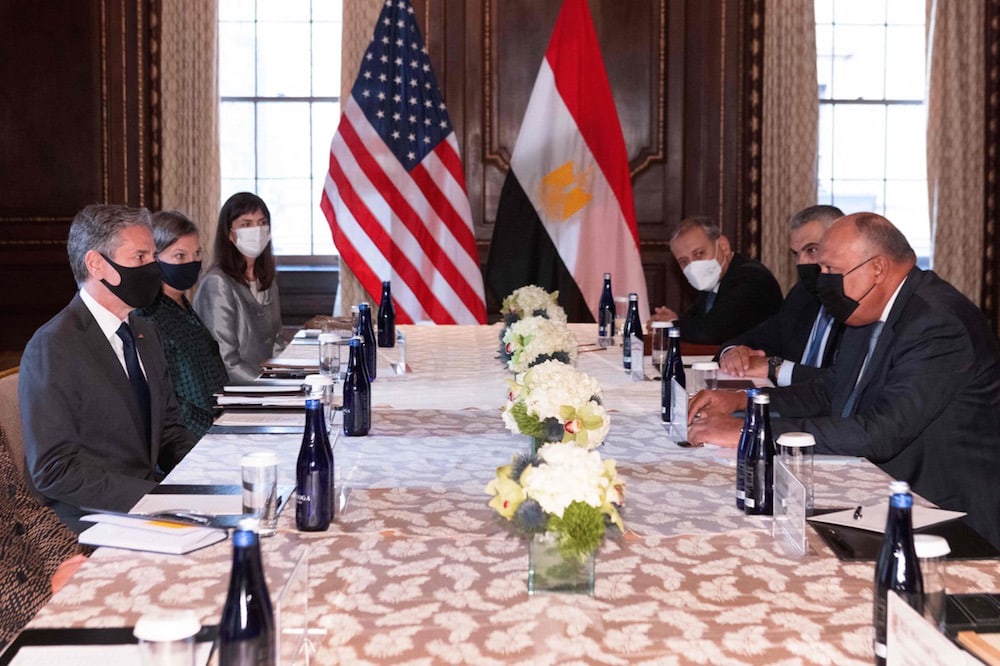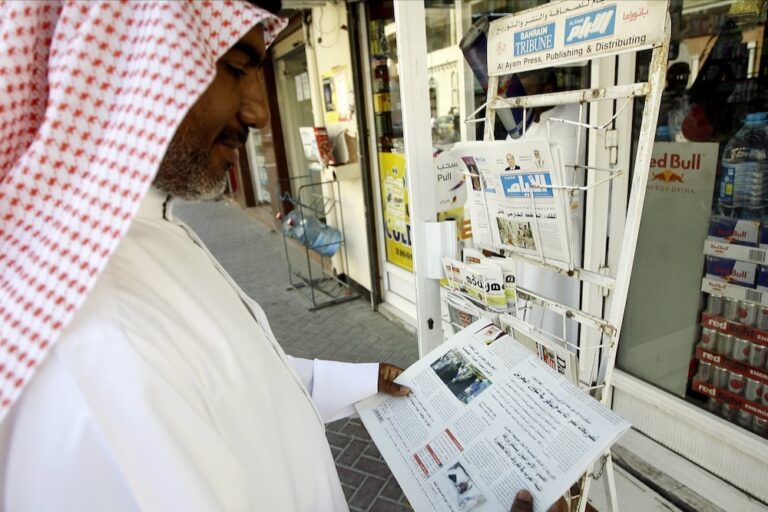September 2021 in Middle East and North Africa: A free expression roundup produced by IFEX's Regional Editor Naseem Tarawnah, based on IFEX member reports and news from the region.
Jailed activist Alaa Abdel Fattah’s life remains at risk in Egypt. Dubai Expo spurs calls to #FreeEmiratiActivists. Unjustifiable Facebook censorship, and a rise in online hate speech in Palestine.
Egypt: #SaveAlaa, and Biden’s human rights “betrayal”
Reports that detained Egyptian human rights defender Alaa Abdel Fattah was considering suicide due to the dehumanizing conditions of his continued imprisonment renewed calls from the rights community for his immediate release. “His life is in danger, in a prison that operates completely outside the space of the law and in complete disregard of all officials,” wrote Abdel Fattah’s family in a statement.
Held without trial at Tora Prison since a 2019 crackdown on activists, Abdel Fattah has been denied access to reading materials, time outside his cell, and – with increased COVID-19 restrictions – severely limited correspondence with his family, who continue to warn of his dire mental state.
On 13 September, the State Security court renewed the political activist and blogger’s arbitrary detention for another 45 days, prolonging his captivity beyond the two-year maximum time allowance for detentions under Egypt’s Penal Code.
As Egypt’s human rights defenders continue to face dehumanizing conditions behind bars, President Abdel Fattah El-Sisi announced plans to build a new “American-style” prison complex, as the latest addition to the country’s growing prison system. The news came days after the Biden administration approved $170 million in US military aid to Egypt, and declared it would withhold a further $130 million of pledged support until the Egyptian government improved its human rights record.
Rights groups called the move a “betrayal” of the Biden administration’s human rights commitments. “By paving the way to provide the full $300 million, the administration gives license to the Egyptian government to continue perpetrating egregious human rights violations without fear of repercussions,” said the joint statement, highlighting how authorities in Egypt have failed to address even one of the seven necessary steps rights groups called for earlier this year.
UAE: Dubai Expo spurs calls to #FreeEmiratiActivists
As Dubai kicked off its pandemic-delayed Expo 2020, rights groups from the region and around the world mobilized to counter efforts to whitewash the UAE’s human rights record. The Gulf Center for Human Rights and 20 partner organizations, including IFEX, launched an online campaign dubbed the Alternative Human Rights Expo, to advocate on behalf of critical Emirati voices that remain imprisoned for their free expression.
The campaign commenced with a joint letter calling on Sheikh Khalifa bin Zayed al Nahyan to release all imprisoned human rights activists detained in violation of their right to free expression ahead of the Expo. The letter highlighted the cases of Ahmed Mansoor, Nasser Bin-Gaith, and three members of the group of prisoners known as the “UAE 94”, Mohammed Al-Roken, Mohammed Al-Mansoori and Mohammed Abdul Razzaq Al-Siddiq, who since 2011, remain unjustly jailed for their support of political reform.
“The UAE authorities have squashed dissenting voices to such a degree in recent years that it can now be said that there are no human rights defenders left in the country, and freedom of expression and civic space are virtually non-existent,” stated the joint letter.
In October, the campaign will bring together artists, poets, writers, singers, musicians and activists from the MENA region in an online event that will pay tribute to the UAE’s silenced human rights defenders.
Tunisia: Creeping authoritarianism and safeguarding the press
Tunisian civil society organizations warned President Kais Saied against the risk of continuing to tighten his grip on power, and reaffirmed the need to respect freedom of expression and the press. On the heels of a Presidential Decree expanding his legislative powers, Saied’s appointment of Najla Bouden Romdhane as prime minister and the country’s first female premier, has done little to assuage fears from the rights community that Tunisia may be edging towards authoritarianism.
Reporters Without Borders called on the new prime minister to prioritize implementing pledges to safeguard press freedom, highlighting several cases of journalists facing threats, harassment, and detentions by Tunisian authorities. Most recently, Zaytouna TV presenter Ameur Ayed and member of parliament Aloui Abdellatif were arrested for “conspiring against state security and insulting the army” after they criticised Saied on a TV programme.
Fighting for the right to know
Marking this year’s International Day for Universal Access to Information (IDUAI), IFEX members in MENA continued the fight for the right to information. The Association for Freedom of Thought and Expression (AFTE) highlighted the critical need for a Freedom of Information Law to guarantee the right to information in Egypt, calling for the revival of a 2017 draft law it says has been “buried in the drawers of the Egyptian government.”
The Palestinian Center for Development and Media Freedom (MADA) also renewed its demand for the adoption of a right to information law in Palestine. The organization has played a leading role in developing a draft law they say is necessary to enable citizens to participate effectively in public life, and promote government transparency.
Whether it’s on the global, regional, or national stage, IFEX members in Africa have been leaders in advocating for strong access to information laws, and were among the strongest voices behind the creation of IDUAI. IFEX marked the day with a special edition podcast of Africa Brief.
Facebook censorship and hateful networks in Palestine
The Facebook Oversight Board’s decision on a case exemplifying the social media company’s unjustifiable removal of news content related to Palestine is “a step in the right direction, but not enough” said digital rights groups. Marking a first for the region, the Oversight Board’s review of the case concluded Facebook’s content removal was: “an unjustified restriction of freedom of expression on a subject of public interest.”
While digital rights organizations in the region welcomed the decision, they continued to call for an independent audit of the company’s content moderation policies and greater transparency into the requests submitted by Israeli authorities.
Meanwhile, nine out of ten Palestinians were subjected to hate speech on social media platforms on political or gender-based grounds, according to a new report by the Arab Center for the Advancement of Social Media (7amleh). Shedding light on the spread of hate speech among Palestinians online and its impact on their digital rights, the study found that over 71% of those surveyed believe hate speech among Palestinians is spread predominantly on social media platforms, with 85.7% pointing to Facebook as the biggest host to such speech.
In Brief
Bahrain: Imprisoned human rights defender Dr. Abduljalil Al-Singace continued his hunger strike last month to protest mistreatment by prison authorities and the confiscation of his book. Al-Singace has been on hunger strike for over three months, with IFEX members RSF and Americans for Democracy and Human Rights in Bahrain (ADHRB) renewing calls for his urgent release amidst alarming reports of his deteriorated health.
“Being detained for over 10 years shows the depth of oppression in Bahrain,” said ADHRB executive director Husain Abdulla, who called on the international community and the country’s European allies to apply serious pressure on Bahraini authorities to secure Al-Singace’s unconditional release.
Qatar: Authorities detained dozens of citizens following peaceful protests against the country’s discriminatory electoral system last month, according to the Gulf Centre for Human Rights (GCHR). The recently introduced laws regulating the country’s first legislative election – the Shura Council election – sparked unprecedented protests denouncing the laws that rights groups said would “effectively disenfranchise thousands of Qatari from voting or running” in the election.
Saudi Arabia: A new report by Citizen Lab revealed Pegasus spyware was likely used to surveil human rights defender Alaa al-Siddiq before her untimely death earlier this year. According to the report, the 33-year old Saudi pro-democracy activist and executive director of ALQST was likely hacked by a government client of Israeli spyware company NSO Group, beginning in 2015, when she resided in Qatar.
Citizen Lab’s examination of another Saudi activist’s phone also revealed a critical vulnerability in Apple’s iPhone at the hands of NSO Group’s “zero-click” spyware, prompting the company to issue an urgent software patch to block the exploit.



